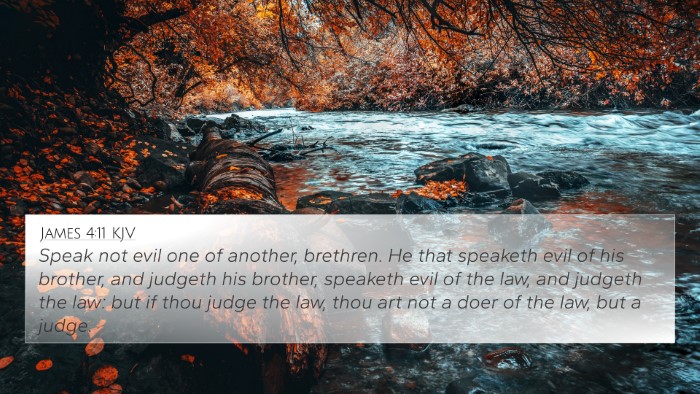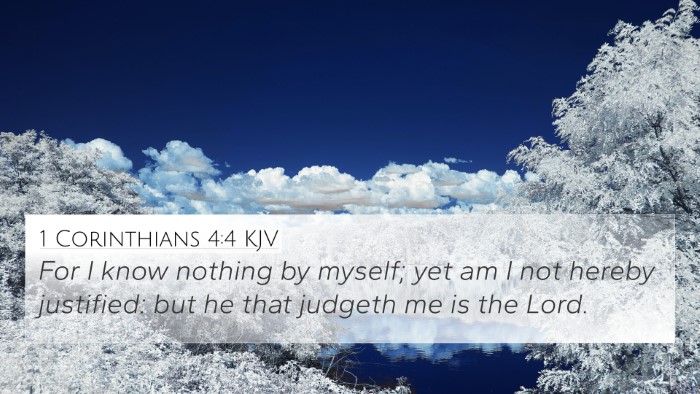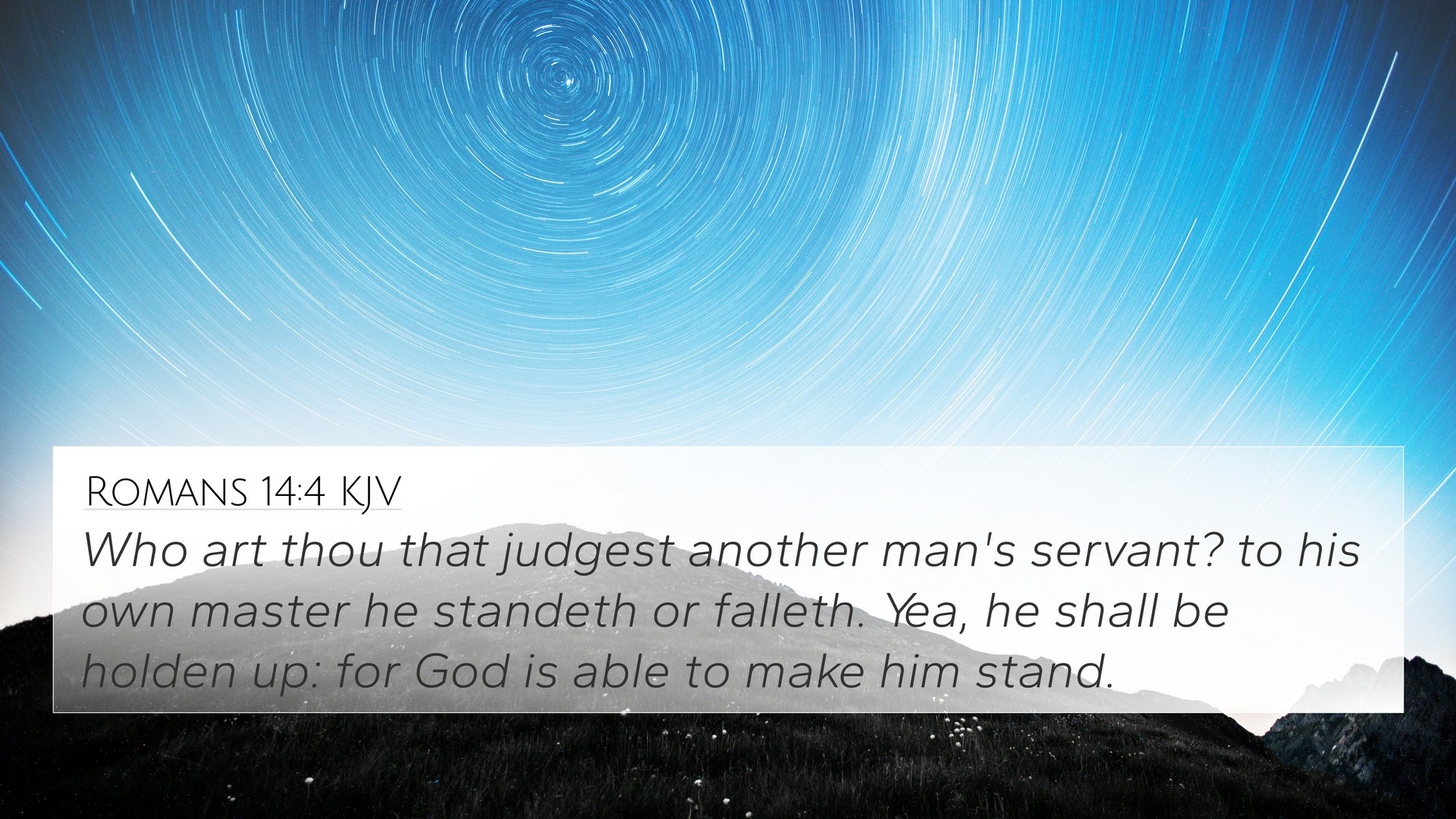Old Testament
Genesis Exodus Leviticus Numbers Deuteronomy Joshua Judges Ruth 1 Samuel 2 Samuel 1 Kings 2 Kings 1 Chronicles 2 Chronicles Ezra Nehemiah Esther Job Psalms Proverbs Ecclesiastes Song of Solomon Isaiah Jeremiah Lamentations Ezekiel Daniel Hosea Joel Amos Obadiah Jonah Micah Nahum Habakkuk Zephaniah Haggai Zechariah MalachiRomans 14:4 Similar Verses
Romans 14:4 Cross References
Who art thou that judgest another man's servant? to his own master he standeth or falleth. Yea, he shall be holden up: for God is able to make him stand.
Uncover the Rich Themes and Topics of This Bible Verse
Listed below are the Bible themes associated with Romans 14:4. We invite you to explore each theme to gain deeper insights into the Scriptures.
Romans 14:4 Cross Reference Verses
This section features a detailed cross-reference designed to enrich your understanding of the Scriptures. Below, you will find carefully selected verses that echo the themes and teachings related to Romans 14:4 KJV. Click on any image to explore detailed analyses of related Bible verses and uncover deeper theological insights.

James 4:11 (KJV) »
Speak not evil one of another, brethren. He that speaketh evil of his brother, and judgeth his brother, speaketh evil of the law, and judgeth the law: but if thou judge the law, thou art not a doer of the law, but a judge.

Romans 9:20 (KJV) »
Nay but, O man, who art thou that repliest against God? Shall the thing formed say to him that formed it, Why hast thou made me thus?

Romans 8:31 (KJV) »
What shall we then say to these things? If God be for us, who can be against us?

Jude 1:24 (KJV) »
Now unto him that is able to keep you from falling, and to present you faultless before the presence of his glory with exceeding joy,

Psalms 37:24 (KJV) »
Though he fall, he shall not be utterly cast down: for the LORD upholdeth him with his hand.

John 10:28 (KJV) »
And I give unto them eternal life; and they shall never perish, neither shall any man pluck them out of my hand.

1 Corinthians 4:4 (KJV) »
For I know nothing by myself; yet am I not hereby justified: but he that judgeth me is the Lord.

Isaiah 40:29 (KJV) »
He giveth power to the faint; and to them that have no might he increaseth strength.

Romans 14:3 (KJV) »
Let not him that eateth despise him that eateth not; and let not him which eateth not judge him that eateth: for God hath received him.

Psalms 37:17 (KJV) »
For the arms of the wicked shall be broken: but the LORD upholdeth the righteous.

Psalms 119:116 (KJV) »
Uphold me according unto thy word, that I may live: and let me not be ashamed of my hope.

Hebrews 7:25 (KJV) »
Wherefore he is able also to save them to the uttermost that come unto God by him, seeing he ever liveth to make intercession for them.

Romans 16:25 (KJV) »
Now to him that is of power to stablish you according to my gospel, and the preaching of Jesus Christ, according to the revelation of the mystery, which was kept secret since the world began,

Acts 11:17 (KJV) »
Forasmuch then as God gave them the like gift as he did unto us, who believed on the Lord Jesus Christ; what was I, that I could withstand God?

Psalms 37:28 (KJV) »
For the LORD loveth judgment, and forsaketh not his saints; they are preserved for ever: but the seed of the wicked shall be cut off.

Deuteronomy 33:27 (KJV) »
The eternal God is thy refuge, and underneath are the everlasting arms: and he shall thrust out the enemy from before thee; and shall say, Destroy them.

Romans 11:23 (KJV) »
And they also, if they abide not still in unbelief, shall be graffed in: for God is able to graff them in again.

1 Peter 1:5 (KJV) »
Who are kept by the power of God through faith unto salvation ready to be revealed in the last time.
Romans 14:4 Verse Analysis and Similar Verses
Understanding Romans 14:4
Bible Verse: Romans 14:4 - "Who are you to judge someone else's servant? To their own master, servants stand or fall. And they will stand, for the Lord is able to make them stand."
Summary of Meaning
This verse addresses the theme of judgment among believers. It emphasizes that each individual is ultimately answerable to God, and that God is capable of sustaining His people. This teaching seeks to promote mutual respect among Christians regarding personal convictions and practices.
Insights from Public Domain Commentaries
Matthew Henry
Matthew Henry emphasizes the importance of humility when it comes to judging others in matters of faith and practice. He argues that only God has the authority to judge His servants. Each believer is accountable to their own master—God—and thus should not be judged harshly by fellow believers. This verse serves as a reminder to focus on one's spiritual state rather than the shortcomings of others.
Albert Barnes
Albert Barnes notes that Paul is asserting the right of each individual to follow their own conviction without fear of judgment from others. He highlights that the phrase "to their own master" indicates that everyone has their own relationship with God, who is able to provide the necessary strength and support for them to stand firm in their faith. This reinforces the idea of personal responsibility in spiritual matters.
Adam Clarke
Adam Clarke expands on the consequences of imposing one's judgments on others, stressing that as servants of Christ, believers must answer to Him alone. Clarke points out that a true servant of God will strive to remain faithful despite external pressures, and it is God who will ultimately judge and support them in their efforts.
Key Themes and Connections
- Judgment and Accountability: This verse highlights the importance of understanding who holds the ultimate authority over a believer's life.
- Mutual Respect: Encouraging believers to respect differing convictions while remaining unified in Christ.
- God's Capacity to Sustain: A reminder of God's power to uphold and support His servants in their faith journey.
Cross-References Related to Romans 14:4
- Matthew 7:1-2: "Do not judge, or you too will be judged..." - Echoes the theme of refraining from judgment.
- 2 Corinthians 5:10: "For we must all appear before the judgment seat of Christ..." - Highlights personal accountability to Christ.
- Colossians 3:24-25: "It is the Lord Christ you are serving..." - Emphasizes serving God above all.
- James 4:12: "There is only one Lawgiver and Judge..." - Reinforces the message that God alone is the judge.
- 1 Corinthians 4:4-5: "My conscience is clear, but that does not make me innocent..." - Paul’s view on self-judgment versus divine judgment.
- Philippians 1:10: "So that you may be able to discern what is best..." - Encouraging discernment in the faith journey.
- Romans 14:10: "You, then, why do you judge your brother or sister?" - Further explores the theme of relational judgment.
Practical Applications
When reflecting on Romans 14:4, it is vital for believers to practice discernment without condemnation. Here are some practical applications:
- Self-Reflection: Regularly evaluate your own faith and practices before pointing to others.
- Encourage Fellow Believers: Instead of criticism, offer support and encouragement to those with different convictions.
- Focus on Unity: Prioritize unity in Christ over divisive issues.
Resources for Further Study
For those interested in exploring the connections between Scriptures, utilizing tools for Bible cross-referencing can enhance understanding:
- Bible Concordance: A reference tool to find related verses.
- Bible Cross-Reference Guide: Helps identify thematic links between verses.
- Cross-Referencing Bible Study Methods: A structured way to engage in deeper biblical study.
Conclusion
Romans 14:4 is a powerful reminder of the importance of humility and grace in the Christian community. It emphasizes that our focus should be on our relationship with God rather than on judging others. As believers, we must recognize our mutual dependence on Christ's strength to sustain us. By embracing these principles, we can foster a more loving and understanding faith community.



